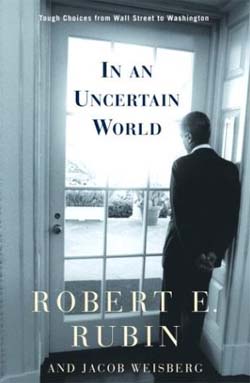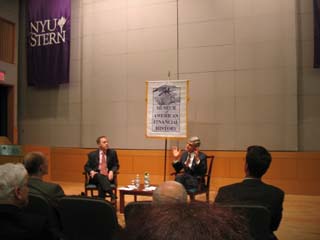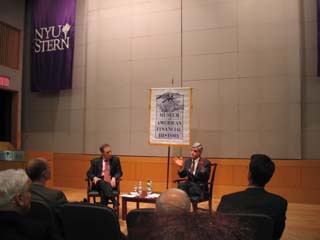trade
event
 |
Part of the job description of every CEO is being able to communicate his vision and strategy to his people and customers. In the case of Bill Clinton, despite his "enormous ability to communicate" (which I can vouch for [1]), the one thing he was unsuccessful at communicating was the perceived need to maintain a balanced government budget to his constituents. Today, we're running a half a trillion dollar budget deficit from a surplus just 4 years ago and no one seems to know why to care. After being credited for leaving a strong economy in the late 90s, you can imagine how Bob Rubin felt towards free-spending, liberal Republicans.
I had the fortunate luck of listening to Bob Rubin - the economist of the Democratic party, former CEO of Goldman Sachs, former Treasury Secretary under Clinton, and current Chairman of the Exec Committee of the Board of Directors at Citigroup and author of "In An Uncertain Time" - speak at a book signing on Thursday, Oct 14 at NYU-Stern School of Business about his thoughts on the economy and global trade policy. Although he presented his views as non-partisan as possible, his sharp comments against current policies gave away his allegiance.
So why should anyone care about the economy? According to Rubin, they shouldn't, unless they care about their social security. The basic concept is to relate this mind-boggling concept into how it relates to you and me. Unfortunately, according to Rubin, most of us are underinformed and no amount of simplifying is going to make us get it. Further, there's no "natural political constituency for fiscal conservatism" in a society raised on credit cards and cheap loans. Personally, if you want me to care about the deficit (or surplus, for that matter), tell me how it'll take me 10 more years than normal to own a home or $100,000 extra to raise a kid through 18. But if the Clinton administration's economic dream-team couldn't figure out how to get us to understand it, can you imagine Bush simply understanding any of it? (Note to reader: I should mention that I will probably be voting for Bush [2]. I personally have no issues with Bush's intellect. After all, I don't admire the man, just his accomplishments all things considered.)
Robert Rubin is an interesting character. He thinks faster than he can spit it all out, and yet, during his late 90s tenure as Treasury Secretary, he was renowned for his three-word vocabulary. He believes in long-term strategy, not the short-term push for "earnings improvement" prevalent more so today than pre-1992, when he first moved to Washington. He predicted this problem was simply going to get worse in lieu of increased pressure on accountability. He did weigh the possibility that shorter timeframes on which to show improvement in your business may actually be responsible for so many high-performing companies and that long-term goal-setting may have been what lead to Japanese economic problems since they perpetually deferred corporate accountability further and further into the future. Which works best? The answer is always a little bit of both.
And despite being a die-hard Democrat, he advocated outsourcing as a natural business solution, however, moderated his views by claiming that trade globalization also needs a strong education system, good relocation programs for displaced workers, sound fiscal policy, stimulation of competition, and plenty more research supporting it all.
Overall, this event merits 3 pluses.


Write to Al Berrios at editor@alberrios.com
1 "Sanford C. Bernstein & Co. Twentieth Annual Strategic Decisions Conference"
2 "What Manager Proves His Worth In Only 4 Years? Why I'm Voting For Bush"
Disclaimer:
The recommendations, commentary and opinions published herein are based on
public information sometimes referenced via hyperlinks. Any similarities or
likeness to any ideas or commentary from any other sources not referenced
is purely coincidental. al berrios & co. cannot control any results occurring
from advice obtained from this publication nor any opinion(s) conveyed by
any reader of this publication.
(c) 2004. All Rights Reserved. al berrios & company, inc. Published
by al berrios & co. This Report may not be reproduced or redistributed
in any form without written permission from al berrios & co., subject
to penalty.